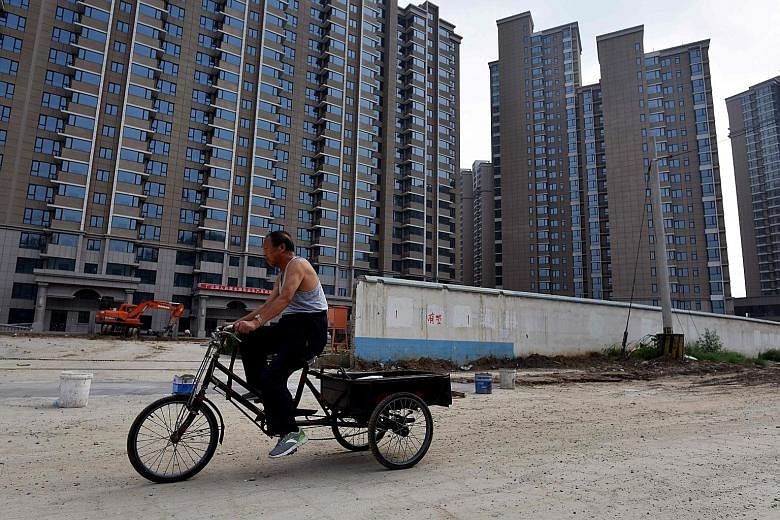In China, ask any newcomer to a city, and chances are, they dream of owning their own flat one day.
But with housing shortages and soaring property prices across many Chinese cities, the Chinese government hopes to get people to see that renting a home is as good as owning one.
The central government has thus started a campaign to encourage local governments and industry players to develop rental housing.
On Nov 16, the Beijing government announced plans to set aside 200ha of land a year for the next five years for rental housing. This translates into making about 400,000 new rental flats available by 2021.
The move is in line with the central government's directive of ensuring that "housing is for living in, not for speculation", Beijing News quoted a local official as saying.
Beijing, along with 11 other major cities, including Shanghai and Guangzhou, were selected in July to start pilot programmes to build rental housing projects.
Rental housing is not subsidised public housing for the needy, but built for rental purposes.
It is needed as the current supply of rental housing is mainly from individuals renting out their investment properties, which means supply is mostly fragmented and ad hoc, said analysts.
The rights of tenants are not well protected generally, making renting a place a less attractive option.
In recent months, Guangzhou and Beijing have also announced policies to give tenants equal rights as home owners. This means that tenants would now be allowed to send their children to local schools even if they do not have local hukou, or household registration permits. Smaller cities like Zhengzhou, Yangzhou and Jinan have said they will make it easier for tenants to obtain local hukou.
Despite the changes,some, like administrative assistant Zoey Wang, 23, who moved to Beijing from north-eastern Liaoning province a year ago, feels there is still insufficient protection of tenants' rights.
"Even if my landlord violates the contract and evicts me, there's nothing very much I could do, except to just move out as told," she added.
According to data by research firm Askci, released in May, the average price of new flats in Beijing is around 68,000 yuan (S$14,000) per sq m and the average monthly salary was around 10,000 yuan. A couple will need to save all their earnings for 25 years to pay for a 90 sq m apartment, the size of a four-room HDB flat in Singapore.
Despite the high prices, property agent Michael Guo, 28, who has a young son, is determined to buy a flat. "I want to be able to stay on in Beijing, and having a flat that I can call my own will make me feel more secure," he told The Straits Times.
He had moved to Beijing from his hometown in central Henan province with his wife in search of a better job in the capital. In five years, he has moved four times. Now, home is an 80 sq m two-room apartment in the suburbs, which he rents for 3,200 yuan a month.
Given the preference for owning over renting a home among the Chinese, analysts are not optimistic that the push for rental housing can do much to cool the red-hot market.
Credit rating agency Moody's has said this will not affect sales of property developers over the next six to 12 months, given "the general desire of the Chinese to own their homes".
The limited supply of rental housing is another hurdle, analysts told The Straits Times.
"There are very few projects that allow people to rent for three years or more," said Mr Yan Yuejin, an analyst with Shanghai-based E-house China R&D Institute.
"We haven't seen property developers making big moves to buy land to develop into rental housing. We're only starting to see some state-owned enterprises investing in the development of rental housing," Mr Yan pointed out.
Mr Joe Zhou, head of research for property consultant JLL China, said the extremely high cost of acquiring land makes it impossible for private property developers to find it lucrative to develop rental housing.
"Many large private developers are very willing to make strategic plans to enter this market. But I've yet to see any one of them really investing capital in this area," he said.
He noted that the Shanghai government has recently auctioned land parcels at a low price for rental housing development. But they are only for state-owned enterprises, as the authorities want to remain in control of the land, an increasingly scare resource in large cities.
"So it remains to be seen how long it will take for policies to fall in place to incentivise developers to develop rental housing, and eventually for it to become a market," he added.
But optimists believe rental housing could prove to be lucrative in the long run. According to a research report from Orient Securities, China's rental housing market will reach 4.2 trillion yuan in revenue by 2030, up from 1.3 trillion yuan now.

